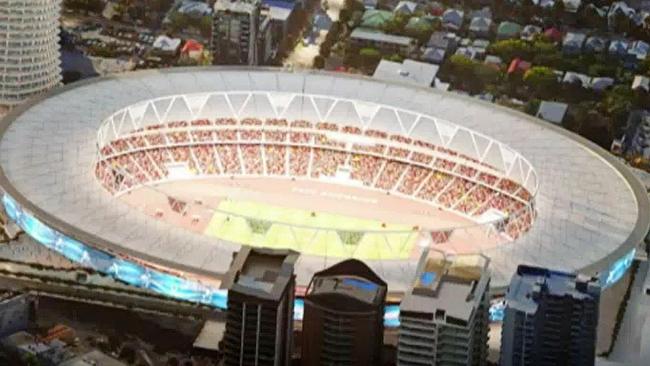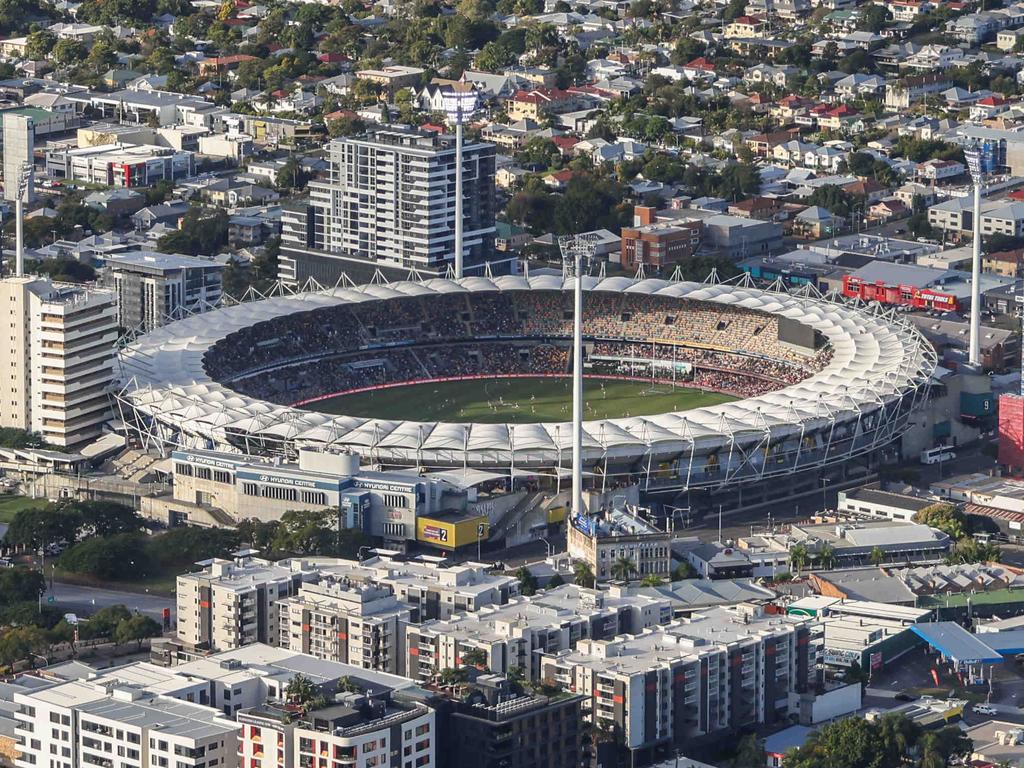Brisbane Olympic arenas in race to be world’s most expensive
Brisbane’s showcase 2032 Olympics arenas will rank among the world’s most costly sports venues despite new rules that are supposed to make hosting the Games cheaper.

Brisbane’s showcase 2032 Olympics arenas will rank among the world’s most expensive sports venues despite new rules that are supposed to make hosting the Games cheaper.
Numbers crunched for The Australian show that a rebuilt Gabba at $2.7bn is double the cost of Perth’s Optus stadium but will accommodate 10,000 fewer spectators. The Olympic athletics and closing and opening ceremonies are to be held there.
The cost per seat at the revamped Gabba is $54,000 against $21,720 for the $1.33bn home of the AFL and test cricket in the West, currently Australia’s most expensive stadium with a capacity of 60,000.
But that pales against the planned $2.5bn Brisbane Arena where the Olympic swimming is set to be staged in a drop-in pool. Its 17,000 seats will each cost an eye-watering $147,058 – making them the most expensive on the planet, according to an analysis by economist Colin Dwyer, adjunct professor at James Cook University.
“The stadiums that are going to be built cost three times more than originally identified,” he said. “As forecast, they are expensive by Australian and world standards and will have a considerable impact on regional Queensland.”
The International Olympic Committee – which awarded the Games to Brisbane 20 months ago – said it was advised by the bidders that no venue would be built or renovated specifically for the event. “Any construction or upgrading was already planned and would be delivered irrespective of the Games to meet the needs of a fast-growing region and population,” its spokesman said.
“This is in line with the reforms of Olympic Agenda 2020 and the New Norm, which look for the maximum possible use of existing and temporary venues. No new infrastructure or venues are required to host the Games, and any capital investment plans must be part of the long-term development goals of the hosts.”
However, infrastructure expert Adrian Dwyer warned the focus on venues was sidelining the greater challenge of developing and integrating public transport and the new amenities that would be needed to host a uniquely regionalised Games in 2032.
“This is the most decentralised Olympics ever, with three hubs of Brisbane, the Gold Coast and the Sunshine Coast. But you also have soccer in Cairns and Townsville – which is like holding the London Olympics with the football matches in Rome,” said Mr Dwyer, chief executive of think tank Infrastructure Partnerships Australia.
“There’s a lot of focus on venues. But I’m not hearing discussion or detail on how you connect those venues … so I think we need to get on with some stuff here.
“You need to start talking about having the capacity, the quality, the reliability of transport connections … if you don’t want to have the mistakes made in Atlanta (Olympics in 1996) where we nearly had a circumstance where athletes were missing their events because they weren’t connected effectively between where they were living and where they were performing.”
As reported on Saturday, the blowout in the Gabba redevelopment’s preliminary costings from $1bn to $2.7bn was key to the funding deal between the federal and Queensland governments being reworked to make that project a wholly state responsibility, with Canberra taking charge of Brisbane Arena.
State Liberal National Party infrastructure spokesman Jarrod Bleijie called on Premier Annastacia Palaszczuk to justify the 170 per cent increase in the Gabba costings.
“All we have heard from the Premier is that commodities have gone up,” he said. “I would like the Premier to explain what commodities have gone up, what they have increased by and how that equates to a 170 per cent blowout from her original announcement.
“This is taxpayer money, there needs to be transparency around it. The government actually has an obligation to explain where every dollar is being spent.”
Brisbane Lord Mayor Adrian Schrinner said the first he knew of the original $1bn price tag was when Ms Palaszczuk revealed it in 2021 and demanded that then prime minister Scott Morrison commit the commonwealth to pay half in the lead-up to the IOC’s formal decision on the bid.
“It all happened very quickly,” Mr Schrinner said. “Having said that, I will put on record I do understand and support the need to revitalise the Gabba.”
Additional reporting: Lydia Lynch







To join the conversation, please log in. Don't have an account? Register
Join the conversation, you are commenting as Logout